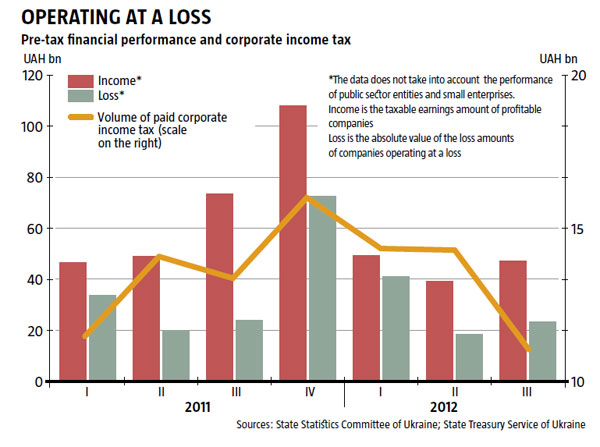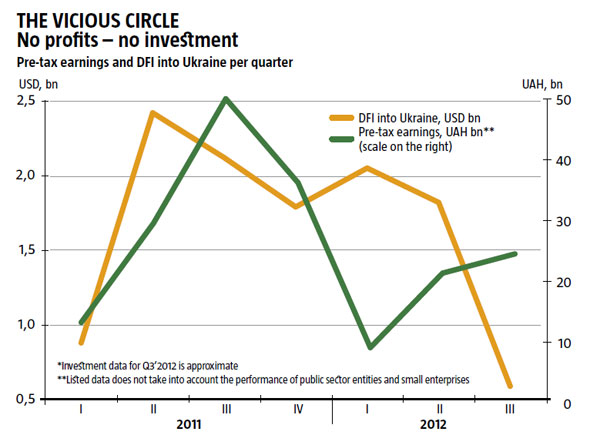In 2012, business was struggling to survive, let alone develop. The financial performance of unprofitable companies plummeted in Q1’2012, followed by profitable businesses in the next quarter.
Despite this trend, tax authorities continued to pressure businesses, squeezing out income tax to fill the budget.
Over the first six months of 2012, the performance of industries controlled by oligarchs, oriented at the domestic market that include companies involved in the production of clothes and leather goods, and wood processing, fell significantly, sometimes at a double-digit rate. Ukrainian producers lost part of the domestic market as a result of tax and regulatory pressure, as well as the overvalued hryvnia, despite growing consumer demand backed by increased nominal salaries. This was the result of the government’s efforts to please the electorate using budget funds. Imported, rather than Ukrainian goods flooded the market as imports grew by 8.5% over the first six months of 2012.

Affected by the sluggish global economy that hit exporters, Ukrainian industry stagnated, experiencing a 1.4% decline over 10 months compared to the respective period in 2011.
The construction industry also operated at a loss, its output falling by 10.2%, while cargo turnover declined by 6.4%. The unfolding financial crisis saw business profits decline more than two-fold in Q3’2012.
2013 promises more difficulties for non-oligarch business. Pressed by the budget deficit, the government will exert unsustainable tax pressure on business, depleting its working capital.
In addition, the government tolerates raider attacks which aggravate the business climate and scare away investors. As a result, the potential for economic growth and the choice of tools to resist the looming crisis show a marked decrease. Meanwhile, the NBU’s ineffective monetary policy has led to critically high interest rates, making loans inaccessible and provoking a money deficit in the economy. Before the election, the government raised the minimum salary rate. This imposed a huge financial burden on companies as they had to raise salaries for their staff with no added efficiency to offset extra spending. As a result, many companies became uncompetitive, went partially into the shadow and suspended investment.

The number of companies operating at a loss will increase dramatically. They will cut salaries and reduce the number of staff, therefore official and hidden unemployment is bound to increase. Eventually, Ukrainian consumers will spend less, decreasing retail turnover, which has been growing so far, albeit slower every month. Price cutting against the backdrop of declining output signals falling purchasing capacity which is extremely dangerous for the economy. Shrinking demand will inevitably reduce output. Since the government has no strategy to stimulate domestic demand and cannot stop this process, output is likely to fall further. This will trigger a full-scale recession that may harm all branches of the economy. Economic decline in 2012 had the worst impact on the earnings of big enterprises. In 2013, small and medium businesses will suffer most, as they are largely oriented at the domestic market, operating in trade, real estate and farming.
A combination of negative factors, such as tax and administrative pressure, with objective economic difficulties, will push business owners to switch into the shadow or the closure of businesses on a massive scale, until better times.

